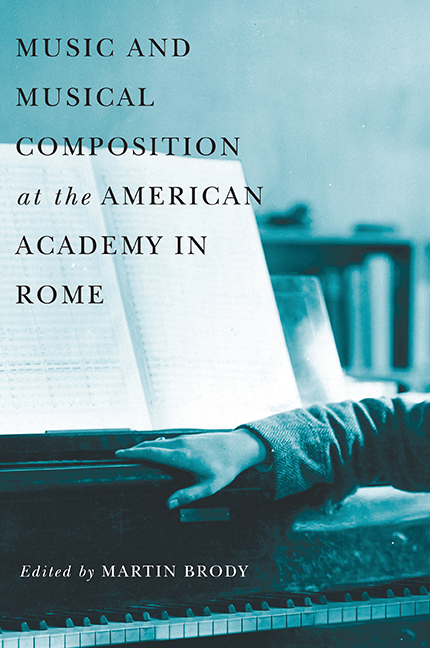Book contents
- Frontmatter
- Contents
- List of Illustrations
- Introduction
- Part One A History of the Rome Prize
- Part Two Origins, Ideology, Patronage
- 3 The Classicist Origins of the Rome Prize in Musical Composition, 1890–1920
- 4 “Picked Young Men,” Facilitating Women, and Emerging Composers: Establishing an American Prix de Rome
- Part Three Two Case Studies in Internationalism
- Part Four Primary Sources
- Appendix: Composers at the American Academy in Rome, 1921–40
- Selected Bibliography
- List of Contributors
- Index
4 - “Picked Young Men,” Facilitating Women, and Emerging Composers: Establishing an American Prix de Rome
from Part Two - Origins, Ideology, Patronage
Published online by Cambridge University Press: 25 October 2017
- Frontmatter
- Contents
- List of Illustrations
- Introduction
- Part One A History of the Rome Prize
- Part Two Origins, Ideology, Patronage
- 3 The Classicist Origins of the Rome Prize in Musical Composition, 1890–1920
- 4 “Picked Young Men,” Facilitating Women, and Emerging Composers: Establishing an American Prix de Rome
- Part Three Two Case Studies in Internationalism
- Part Four Primary Sources
- Appendix: Composers at the American Academy in Rome, 1921–40
- Selected Bibliography
- List of Contributors
- Index
Summary
A week devoted to ultra-modern music gave us the power to distinguish styles and form judgments as to its value and merits. We returned to Rome more than ever impressed with the fact that classical composition must be the foundation on which we must build.
—Felix Lamond, professor of music, American Academy in Rome, 1925In 1921, the American Academy in Rome (AAR), which had been established amidst the affl uence and philanthropy of the Gilded Age, entered the postwar era when it initiated a long-desired fellowship program for composers. The product of a major internationalizing impulse in the United States after World War I, the composer fellowships appeared in a very different moment from that when AAR had been conceived. The notion of the “Europeanized American” gave way to that of a transnationally recognized artist who frequently—even proudly—asserted an American identity through composition. This postwar period brought its own version of affl uence, albeit with new money and a tendency toward an aesthetic eclecticism. It was a time of self-conscious modernization in the culture at large, and a whole new generation of American composers vied for the mantle of “American genius.” A select number eventually succeeded, most notably the Brooklyn-born composers Aaron Copland and George Gershwin, whose major new concert works were reaching New York stages by the middle of the 1920s.
Yet as it turned out, those vanguard impulses, which in hindsight appear as the most valorized musical products during the interwar years, were not the main goal of the Academy. Instead the institution adhered to its bedrock principle of advocating “classical” values, thereby extending to musical composition the goals it promoted for artistic expression as a whole. Patronage networks that had supported art and architecture at the Academy in the fi rst two decades of the twentieth century were expanded to embrace music, and the role of women as patrons of the Academy's composers became particularly important. This new composers’ prize, an American counterpart to the French Prix de Rome, culminated the celebration of AAR's twenty-fi fth anniversary. The prize emerged at an historical moment when an unprecedented advocacy of composers took hold in the United States, yielding a growing infrastructure to support their work.
- Type
- Chapter
- Information
- Music and Musical Composition at the American Academy in Rome , pp. 159 - 192Publisher: Boydell & BrewerPrint publication year: 2014

